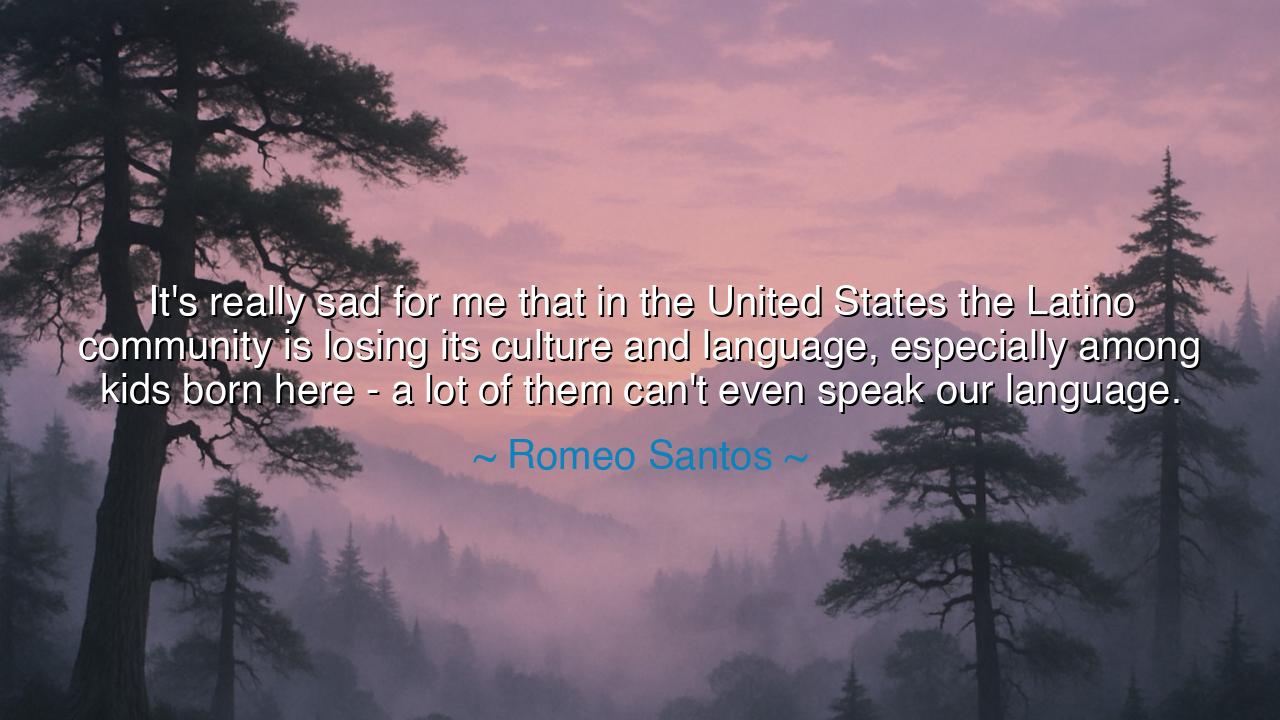
It's really sad for me that in the United States the Latino
It's really sad for me that in the United States the Latino community is losing its culture and language, especially among kids born here - a lot of them can't even speak our language.






Romeo Santos once spoke not as a singer, but as a guardian of memory, when he said: “It’s really sad for me that in the United States the Latino community is losing its culture and language, especially among kids born here—a lot of them can’t even speak our language.” His words are a lament and a warning—a call to remember what must not be forgotten. For in his sorrow lies the ancient truth that when a people lose their language, they begin to lose their soul; when they forget their culture, they begin to drift like leaves cut from the tree of their ancestors.
In every age, the wise have known that language is more than sound—it is identity, memory, and belonging. The Latino community, vast and diverse, carries within it the echoes of centuries: the rhythm of Spanish and Portuguese, the songs of Taíno, Nahuatl, and Quechua, the prayers whispered in fields and kitchens. To lose that voice, Santos mourns, is to lose the bridge between generations. When the children of immigrants grow silent in their parents’ tongue, something sacred fades—the ability to speak to one’s grandmother, to understand the lullabies that once calmed nations, to dream in the rhythm of one’s blood.
The ancients would have seen in this lament the same tragedy that befell countless civilizations. When Rome conquered Greece, the conquerors took the Greek gods but forgot the Greek spirit. When colonizers came to the Americas, they tried to erase the tongues of the native peoples—and with them, the wisdom that lived in their words. To lose language is to lose a worldview, for each tongue carries a way of seeing, of feeling, of naming beauty and grief. Santos speaks not just of Spanish, but of inheritance—of the sacred duty to keep alive what ancestors built with song and sweat.
There is a story that mirrors his sorrow. When the Irish language began to fade under English rule, the poet Seamus Heaney wept not for words alone, but for memory. He wrote that a lost language is like “a well gone dry,” and that its silence is more painful than death. So too, Santos watches a new generation grow fluent in technology but mute in tradition. The children born on foreign soil inherit prosperity, but risk losing poetry. Their success, though dazzling, comes with the quiet price of forgetting who they are.
Yet, within Santos’s sadness there is hope. For his very act of speaking—his grief for what is being lost—is a kind of resistance. The artist’s lament becomes a call to renewal. He reminds the young that their heritage is not a burden but a treasure, not a limitation but a key. To speak your mother’s tongue is to keep her alive; to dance to her music is to carry her heartbeat into the future. Culture, after all, is not inherited by birth but maintained by love.
In the wisdom of the ancients, the way to preserve a civilization was through storytelling and song. Every time a parent teaches a child a proverb, a recipe, or a rhythm, they rebuild the temple of their ancestors stone by stone. Santos, through his music and words, continues this sacred work. He knows that the songs of the past must not fade into nostalgia but must live in the voices of the living. His sadness is the fire that keeps him singing.
So let the teaching be this: do not let your heritage fade into convenience. Speak your ancestors’ words, even if your tongue trembles. Teach your children the stories that shaped your blood. Remember that culture is not what you own—it is what you carry and give. The world may push for sameness, but the wise know that diversity of spirit is the strength of humanity. As Romeo Santos reminds us, the loss of language is not just a cultural wound—it is a silence in the human symphony. Guard your voice, therefore, and in doing so, keep your people alive.






AAdministratorAdministrator
Welcome, honored guests. Please leave a comment, we will respond soon